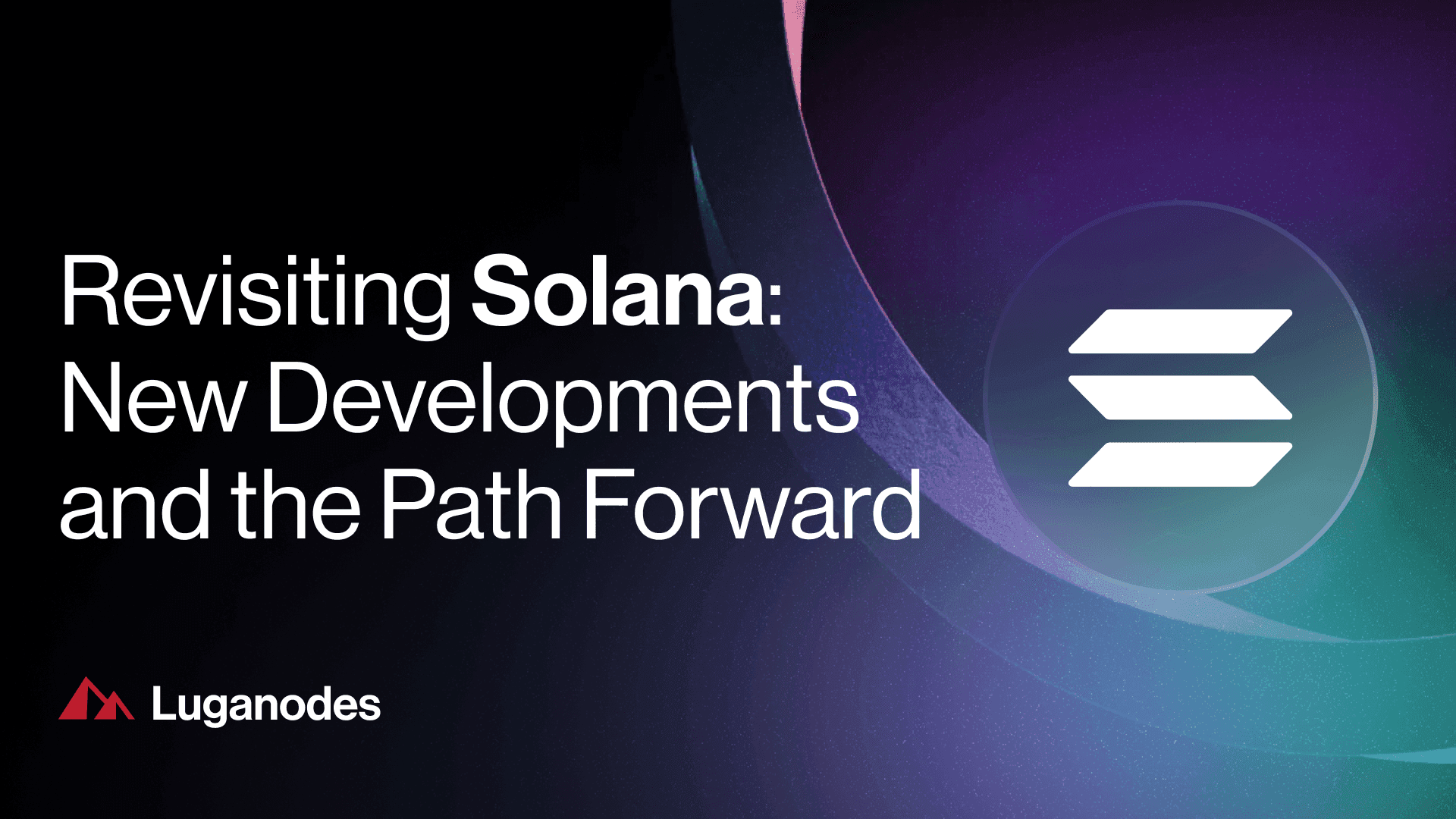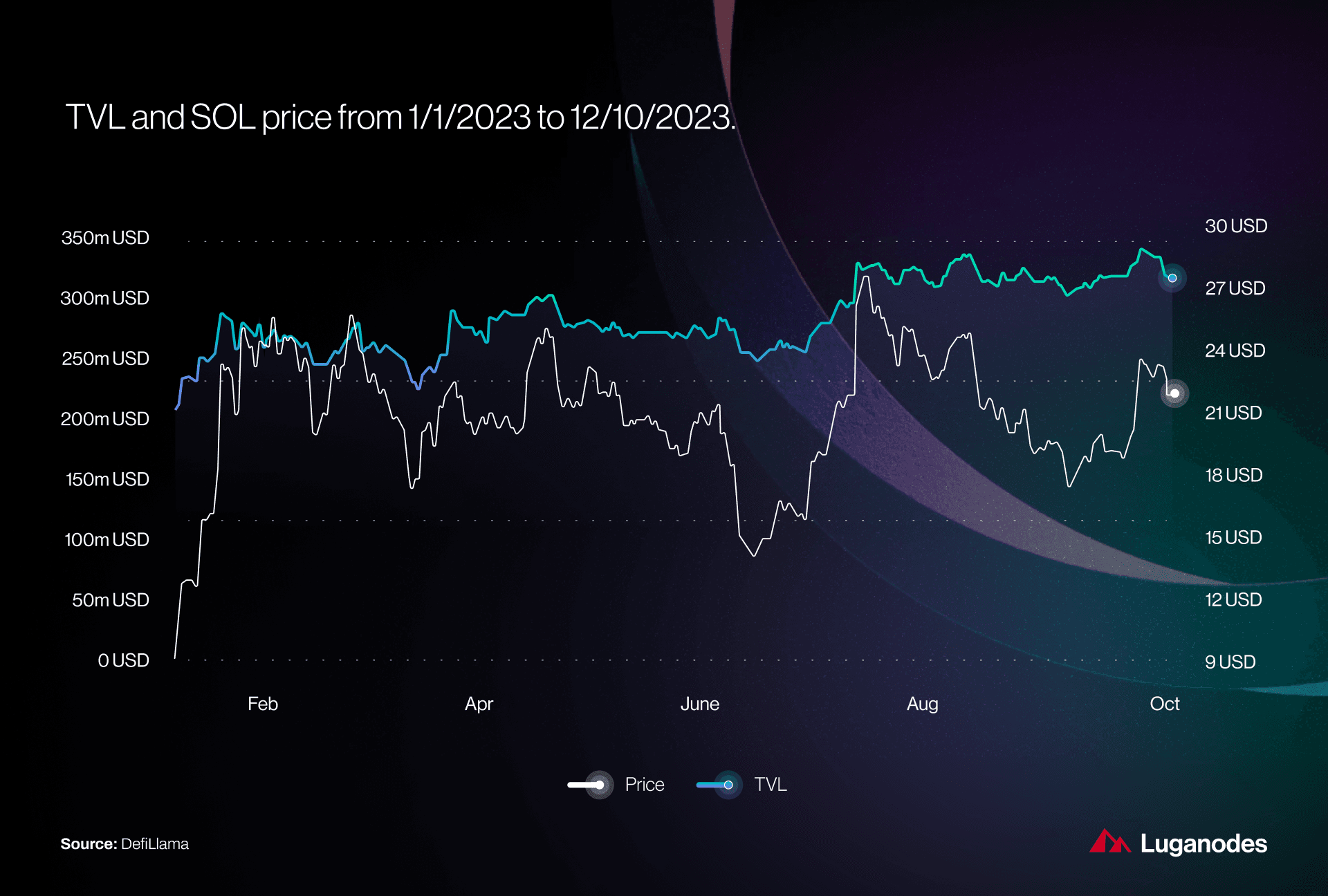Network
10 min read
Revisiting Solana: New Developments and the Path Forward
Innovations that Define its Future

Published on
October 11, 2023
Solana and its industry-wide impacts are very well known. Since its inception in 2017, Solana has not only disrupted but redefined the cryptocurrency space, setting new standards for speed, scalability, and innovation. Since our last overview on Solana - the greater cryptocurrency space has gone through many ups and downs - and has had changes that came along with it. Solana is no different, and here we are with the latest developments.
Solana’s Unique Edge
The core offerings and values of Solana haven't changed. Solana continues to excel in delivering on its promises, providing users with the same unparalleled speed, decentralization, scalability, and environmental consciousness.
With block times of just 400 milliseconds, Solana ensures that users are not kept waiting, making it a standout in the world of cryptocurrencies. They even challenge users to try and Break Solana - there’s nothing like some fun keyboard mashing to reinstate your trust!
Its network, validated by thousands of nodes, remains steadfast in its commitment to data security and censorship resistance. The high degree of decentralization comes from client diversity and the wide geographic distribution of nodes. Another testament to this fact is the relatively high Nakamoto coefficient - which has shown consistent growth.
Scalability is as impressive as ever, handling thousands of transactions per second while maintaining minimal fees. Solana's dedication to environmental sustainability endures, with each transaction leaving a negligible carbon footprint.
What initially drew people to Solana - processing speeds of 50,000 TPS, while maintaining a measly cost of $0.00025, is still relevant today. An offering which still eclipses major chains like Ethereum. Solana hence remains a very popular choice for transactions and smart contract deployment.
New and Improved!
Solana has also received multiple upgrades and introduced new features in recent times. These upgrades have propped up the value of the chain and rejuvenated the interest in the network.
Upcoming Firedancer Validator
The original Solana validator client, while being very innovative, faced certain limitations that affected its performance and scalability. One of the key challenges was its capacity to handle concurrent transactions and support sharding, which became increasingly crucial as the Solana network expanded. That brings us to a major event - the Firedancer Validator.
As a next-generation independent validator client for Solana, Firedancer brings many upgrades to the chain. Under development by Jump Crypto, this update can bring about greater client diversity, increased performance, and scalability and it may even make running nodes more economical.
First and foremost, it elevates transaction processing capabilities to an unprecedented level, with support for a higher number of concurrent transactions. This translates to lightning-fast transaction processing times and a significant reduction in potential bottlenecks. These impressive feats are made possible by leveraging the efficiency and reliability of C and C++ programming languages.
Moreover, the Firedancer upgrade introduces support for sharding, a critical feature that enhances scalability as the Solana network continues to grow. Sharding enables the blockchain to scale horizontally, opening up new dimensions of capacity and efficiency.
Firedancer doesn't stop there. It optimizes networking and P2P communication through advanced protocols, streamlining the propagation of blocks and transactions. Techniques like compression and batching significantly reduce the volume of data transmitted across the network, further enhancing its efficiency and speed.
The upgrade also ushers in an enhanced consensus protocol. Firedancer utilizes a modified version of Solana's proof-of-stake (PoS) consensus protocol, designed for greater efficiency and reliability than the original. It's essential to note that Firedancer acts as an augmentation rather than a replacement for the existing Solana validator client, ensuring a smooth transition to this advanced ecosystem
Solana Virtual Machine currently controls just 3% of the market, but with the Firedancer upgrades, Solana will finally have the muscles to push for a larger portion of the pie.
V1.16 Update
Solana’s V1.16 update has introduced significant improvements, mainly focusing on innovations that greatly improve privacy. The finalising of this update took place in September 2023, after months of development and a security audit by Halborn.
Confidential Transfers: Solana's V1.16 update introduced "Confidential Transfers," a groundbreaking feature that enhances user privacy by encrypting SPL token transactions. This innovation allows blockchain transactions to occur without revealing sensitive transaction details, marking a significant step forward in privacy-conscious blockchain technology.
Performance Optimizations: Solana brings multiple performance optimizations and stability improvements to the network. This not only enhances the efficiency and stability of Solana but also significantly reduces RAM usage for validators. In fact, at Luganodes, we noted that our validator was running smoothly on just 39 GB of RAM, which is a significant improvement from around 120GB from previous versions.
Zero-Knowledge Proof Capabilities: One of the most noteworthy aspects of this update is Solana's native support for an efficient elliptic curve (BN-128) and streamlined zero-knowledge proof verification. This advancement in zero-knowledge proof technology decreases the overall cost of generating and verifying proofs, making Solana more cost-effective and efficient. Furthermore, this capability can be interoperable with Ethereum smart contracts, promoting cross-chain compatibility.
Features
Other than the major upgrades - Solana also brought along some nifty features.
EVM Compatibility with Hyperledger Solang: Hyperledger Solang introduces an exciting shift in the Solana ecosystem by bringing Ethereum Virtual Machine (EVM) compatibility to the platform. With the ability to build on Solana using Solidity, the primary language for Ethereum smart contracts, this innovation bridges the gap between EVM developers and Solana.
State Compression Technology: Solana incorporated a revolutionary new feature that allows developers to store data on-chain at a fraction of the cost. This is made possible by using a combination of Merkle trees and cryptographic hashing to compress data into a much smaller size. This is important for a variety of applications, such as NFTs, decentralized finance (DeFi), and gaming.
Opportunities
The recent developments from a trusted player have marked a new beginning for Solana. We anticipate further utilization of Solana in the near future. Some of these opportunities are already emerging, and here are some of them.
Institutional Adoption
On Solana's website, one can clearly see major companies such as Discord, Google, Meta, and Shopify, which have harnessed Solana's capabilities at some point. Well-versed in serving large industrial clients, Solana continues to cater to these companies. Solana's improving tech stack has attracted enterprises to use the Solana Virtual Machine (SVM).
Solana Pay is available as an approved app integration on Shopify, one of the world's largest e-commerce platforms, enabling USDC transactions. Visa, the world's largest bank card provider and a major player in the payments industry is one of the first to directly use Solana to enhance the speed of cross-border transactions. This milestone represents a futuristic shift in the way transactions are conducted by TradFi institutions.
Growth of Liquid Staking Derivatives (LSDs)
In the last few years, we have seen a craze for liquid staking and platforms related to it. Ethereum has 40% of its staked ETH in liquid staking protocols, while Solana has just about 3-4%. But that is about to change as SOL liquid staking is picking up pace. JitoSOL, a liquid staking token on Solana, has experienced significant growth in recent months, with over 2.4M SOL staked over the course of the year. This growth is a positive sign for the Solana ecosystem, as it indicates that more users are interested in staking their SOL and participating in the network. This can lead to an increase in overall TVL and also aid the security and decentralisation of the network.
Looking Ahead
While we can be hopeful for a success story and keep up with the new developments, we should also be able to see its real-world impact. And yes, we have noticed tangible markers which support the growth of Solana. Solana has shown stable growth since the beginning of this year. The TVL started off this year with $210 million and at the time of writing is at $309 million. The token price started with a low $10 and has more than doubled to $22 as of now. While the change hasn’t been extraordinary - a steady change shows promise when we take all the hurdles, accomplishments and overall developments into account.

Conclusion
That concludes our revisit of the Solana chain. A lot has evolved, while the core elements that define Solana continue to stand for good reasons. It's intriguing to note the numerous changes that have contributed to the chain's improvement and resurgence in the limelight. Progress, innovation, and a forward-looking approach drive the cryptocurrency space forward, and much of this is evident in the Solana story. We're already excited to continue this discussion in another article in the near future!
About Luganodes
Luganodes is a world-class, Swiss-operated, non-custodial blockchain infrastructure provider that has rapidly gained recognition in the industry for offering institutional-grade services. It was born out of the Lugano Plan B Program, an initiative driven by Tether and the City of Lugano. Luganodes maintains an exceptional 99.9% uptime with round-the-clock monitoring by SRE experts. With support for 45+ PoS networks, it ranks among the top validators on Polygon, Polkadot, Sui, and Tron. Luganodes prioritizes security and compliance, holding the distinction of being one of the first staking providers to adhere to all SOC 2 Type II, GDPR, and ISO 27001 standards as well as offering Chainproof insurance to institutional clients.
The information herein is for general informational purposes only and does not constitute legal, business, tax, professional, financial, or investment advice. No warranties are made regarding its accuracy, correctness, completeness, or reliability. Luganodes and its affiliates disclaim all liability for any losses or damages arising from reliance on this information. Luganodes is not obligated to update or amend any content. Use of this at your own risk. For any advice, please consult a qualified professional.